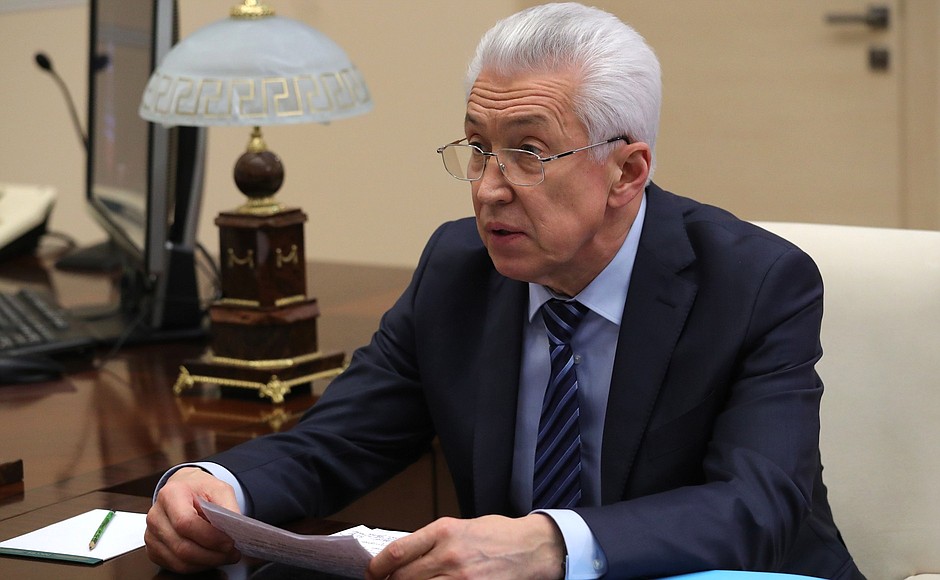
Dagestan: A Return to the Empire?
Dagestan: A Return to the Empire?
Since the second half of January, the Republic of Dagestan has undergone a systemic “cleaning out” of the entrenched local authorities. Similarly, there were recent loud arrests and prosecutions of local authorities in various regions across the Russian Federation—the former head of Sakhalin region, Alexander Khoroshavin, was sentenced to 13 years in a high-security prison colony, and the former governor of Kirov region, Nikita Belykh, received eight years (RBC, February 12). Collectively, these events have contributed to the suppression of regional political elites. However, the case of Dagestan is largely unprecedented. It appears that, in this Northeast Caucasus republic, Moscow is attempting to liquidate the entire local elite, completely replacing it with “federal” appointees.
In October 2017, President Vladimir Putin named a new head of Dagestan, replacing local native Ramazan Abdulatipov with Moscow police general Vladimir Vasilyev, who had no biographical relation to this republic (see EDM, October 13, 2017). Later, Vasilyev appointed as republican prime minister Artem Zdunov, who also was not connected with Dagestan prior to taking this post.
More recently, with the heavy involvement of federal law enforcement and security services, the Kremlin-appointed leadership in Makhachkala has unleashed a wave of arrests of local high-ranking officials. First, Musa Musayev, heretofore the mayor of the republican capital, was apprehended by authorities (see EDM, January 25, 2018). Then, law enforcement arrested Abdusamad Hamidov, the former prime minister, and his two deputies—Shamil Isayev and Rajudin Yusufov (Crimerussia.com, February 5). All of them were sent to Moscow, where, in early March, they will stand trial.
Some Moscow-based experts have suggested these events reflect the defeat of “clan aristocracy” in Dagestan (Newizv.ru, February 5). However, local media outlet Dagestanpost.ru has offered an important clarification: “If you have even a little understanding of Dagestani politics, then the charges against Hamidov, Isayev and Yusufov of establishing a joint criminal organization look ridiculous. They represent three different ethnic groups in Dagestan. Each of these competing ‘clans’ has its own interests” (Dagestanpost.ru, February 21).
Sergey Markedonov, an associate professor of the Russian State Humanitarian University, claims that Dagestan is a unique republic not only for the North Caucasus, but for Russia as a whole, since dozens of local ethnic groups live there. The very name “Dagestan” does not denote any connection to a particular ethnic identity, but instead simply means “country of mountains.” The authorities in this republic have always had to negotiate difficult compromises among its various ethnic groups. During 1994–2006, Dagestan was in fact a parliamentary republic, governed collectively by a State Council, elected from representatives of all local ethnic groups; it was not ruled solely by a governor, as in other Russian regions. The power of the Dagestani ethnic “clans,” Markedonov says, cannot be equated only with corruption. Rather, it is a social reality in Russia’s most multi-ethnic republic, which allowed for a preservation of civil peace there (Caucasustimes.com, February 9).
Today, Moscow’s appointees justify their repressive actions in Dagestan by linking them to a “fight against corruption.” However, as opposition activist and blogger Alexei Navalny has repeatedly proven, corruption flourishes at the highest levels of Russian power (see EDM, March 6, 2017). Therefore, attempting to fight against it only at the lower levels of individual republics is arguably a defeatist strategy.
Sociologist Igor Yakovenko sees another reason for the events presently taking place in Dagestan. He believes the current “anti-corruption” crackdown on the local elites is an attempt by the Kremlin to restore the institution of the “Caucasian Viceregency,” which existed under the Russian Empire. But such “external management” will only lead to the growth of anti-Russian sentiments in the republic, he argues (Afterempire.info, February 12). And his alarming forecast may already be coming true. On February 18, an armed attack on parishioners of the Russian Orthodox Church took place in the Dagestani town of Kizlyar (RBC, February 18).
Similar events occurred in the era of the late Soviet Union, in another North Caucasus republic. Indeed, Putin’s Russia often resembles the period when KGB chief Yuri Andropov was in power, pursuing a unitarist and oppressive policy toward the Soviet regions. At that point Russian official Vladimir Odintsov was appointed by Moscow to head the autonomous Soviet region of North Ossetia, even though he previously had absolutely no connections to this republic. His six-year rule led to a serious aggravation of inter-ethnic relations there (Kavkazr.com, February 11).
Avraham Shmulevich, an Israeli political scientist and specialist oon the North Caucasus, puts forward a completely different explanation for the current wave of high-profile arrests in Dagestan. In his opinion, former prime minister Hamidov was connected to the withdrawal and laundering of Russian money in the West. Thus, if he had left the Russian Federation, he could have been detained by Western law enforcement and might have revealed “uncomfortable” bits of evidence. So in order to contain the scandal inside the country’s borders, Russian authorities preventively arrested him, Shmulevich contends (Afterempire.info, February 14).
Earlier this month, in discussing the ongoing anti-corruption campaign that includes federal law enforcement and security services, the appointed head of the republic, police general Vasiliev declared, “All of Russia has come to Dagestan” (RBC, February 9). Within this remark is the characteristic paradox of current Russian domestic policy. Its leadership calls itself “federal,” but in fact it is proceeding to dismantle Russian federalism through hyper-centralization.


